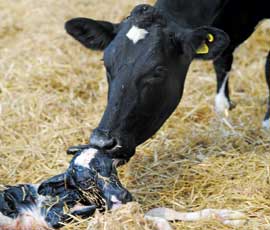Millions invested in salmonella research in cows

More than half a million pounds is being invested in a three-year research project on salmonella at Edinburgh Vet School.
The Roslin Institute at Edinburgh University has received funding from the Biotechnology and Biological Sciences Research Council (BBSRC) to support collaborative research with animal health company, Zoetis – formally Pfizer.
Researchers from the institute and Zoetis will jointly investigate how salmonella enters and persists within the bovine lymphatic system and can lead to contamination of beef for human consumption. This will help them develop and implement solutions to reduce the prevalence of salmonella in meat.
Mark Stevens, chair of microbial pathogenesis at the Roslin institute, said salmonella infections in cattle are significant for two reasons.
“It can cause gastroenteritis and abortion in the animals, thereby harming their productivity and welfare, and contamination of beef and the farm environment can lead to infections in people,” he explained.
Cattle are a significant source of human salmonella infections, he added. Although the animal’s lymphatic system normally helps fight infection, some types of salmonella have adapted to evade the immune system and survive in lymph nodes.
“A key gap in our knowledge is how salmonella enters the lymphatic system in the first place and then persists within it, constraining our ability to design strategies to control infection,” Prof Stevens said.
“We will examine the role of host and bacterial factors in this process and use the results of our research study to identify new and better targets that could help us control salmonella infections in cattle.”
Read more on preventing salmonella risk in cattle
